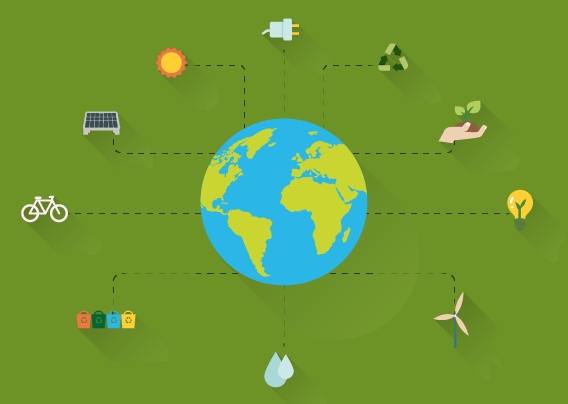
Sustainability, a basic principle for our survival on this planet.
What is sustainability and how do we live sustainably?
Basically the concept of sustainability is directly related to sustainable development, which in essence would be the ability to serve the present generations using techniques and resources that meet the basic needs of the human being without compromising the basic resources of future generations.
In the face of recent human actions, which through modern society have focused on industrialization, mass production, the degradation of the environment and natural resources, the production and use of fossil fuels, the immense production of inorganic waste, among other sustainability is no longer a mere concept, sustainability becomes a basic principle for our permanence and survival on this planet.
The big challenge is launched: how can we live sustainably these days?
The principles of sustainability can apply to an individual, a family nucleus, a community, a single enterprise, a city or even the planet as a whole.
In order to live a sustainable life we must opt for ecologically correct forms of housing that use alternative materials, refuse or recycled materials, wood and demolition bricks, housing projects that enhance the maximum use of natural light and wind circulation. We should value projects that use alternative energy sources such as wind and solar for electricity production, with systems for saving and reusing water and electricity, cisterns and dry toilets, as well as the implementation of an ecological fossa and the use of idle spaces for creation of organic vegetable gardens for the family sustenance next to the organic garbage composting process.
For an enterprise to be classified as sustainable, it must be ecologically sound, promote actions and policies that are socially just, while respecting cultural diversities in a way that becomes economically viable. A sustainable company must value the local community and the resources of the region in which it operates, valuing the regional workforce, creating a career system within the company where it allows employees to be promoted professionally and learn new techniques and knowledge, which training not only for the employee, but also for the company itself as a whole. Minimize the environmental impact of the generated debris, increase the use of renewable energy and promote actions to improve the working environment and the social environment it influences.
In order for tourism to be sustainable, policies must be created to protect the environment and encourage the development of tourism activities in harmony with the local community. Sustainable tourism helps bring income to the community by valuing its potential assets and minimizing environmental impact. Public policies should be created for the protection and preservation of ecosystems and biodiversity, limiting access and establishing rules for tourism activity, especially when dealing with sensitive areas of fauna and flora, or with the creation of parks or natural reserves . It is an alternative to mass tourism that, in its essence, only degrades and does not bring benefits to the environment, or even a lasting economic return to the community.
In the sustainable tourism model, the tourist learns about the importance of the fauna and flora of the region he is visiting, contacts the local community and its customs in a respectful and integrated way, promotes the local artisanal economy, participates in preservation policies and still becomes a breeder of the same concepts once he returns to his homeland.
Any human action should respect the natural cycles, the time of recomposition of the resources and their limits, conserving the integrity of the environment with a consumption that does not surpass its capacity of renewal, respecting thus the cultural diversity and the different existent forms of life.
Considering that all natural elements are affected by the presence of human action, the concept of sustainability means a balance between these elements and the environment. We can achieve a sustainable life based on the choices we make about the forms of production and consumption, food and housing, lifestyles and culture, transportation and waste disposal, thus revealing a conscious relationship with the environment in general, based on ethical and values of shared common sense.
Remember that to be and live sustainably the revolution begins individually, in the home, with small changes in our daily customs.






 ESPAÑOL
ESPAÑOL
 PORTUGUES
PORTUGUES
